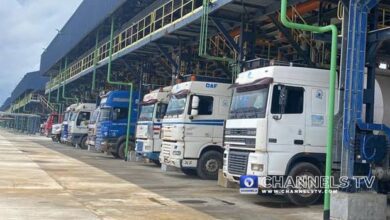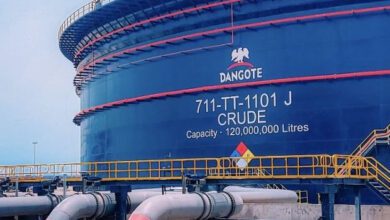
The Vice President, Oil and Gas at Dangote Industries Limited (DIL), Devakumar Edwin, recently raised an alarm over the importation of dirty fuels into the country.
In fact, Edwin directly accused Nigerian Midstream and Downstream Petroleum Regulatory Authority (NMDPRA), of granting licences, indiscriminately to marketers to import dirty refined products into the country.
In what appeared to be a day of lamentation and accusation, the VP also accused the International Oil Companies (IOCs) in Nigeria of doing everything to frustrate the survival of Dangote Oil Refinery and Petrochemicals.
He alleged that the country is playing into the hands of the IOCs by continuing to issue import licences, at the expense of the nation’s economy and at the cost of the health of the Nigerians who are exposed to carcinogenic products.
Edwin said: “In spite of the fact that we are producing and bringing out diesel into the market, complying with ECOWAS regulations and standards, licences are being issued, in large quantities, to traders who are buying the extremely high sulphur diesel from Russia and dumping it in the Nigerian Market”.
According to him, “Since the US, EU and UK imposed a Price Cap Scheme from 5th February, 2023 on Russian Petroleum Products, a large number of vessels are waiting near Togo with Russian ultra-high sulphur diesel and, they are being purchased and dumped into the Nigerian Market.
“In fact, some of the European countries were so alarmed about the carcinogenic effect of the extra high sulphur diesel being dumped into the Nigerian Market that countries like Belgium and the Netherlands imposed a ban on such fuel being exported from its country, into West Africa, recently.
“It is sad that the country is giving import licences for such dirty diesel to be imported into Nigeria, when we have more than adequate petroleum refining capacity locally…”, he lamented.
However, in a swift reaction, the Depot and Petroleum Products Marketers Association of Nigeria (DAPPMAN) rose in defence of the oil marketers.
It said: “no Oil marketer or deport owner imports dirty Fuels into the country” as alleged by the Management of Dangote Refinery.
DAPPMAN further noted that “no member of the association and indeed, no private fuels depot has imported into the country any fuel with specification that is outside of the regulation other than what is currently approved by the NMDPRA, and would wish to state that the information from the Dangote Refinery Management is laced with inaccuracies”.
It noted that “the downstream regulatory authority, NMDPRA, in the very recent past had initially objected to offtakes by our daughter vessels from import mother vessels, via Ship-to-ship operations which usually take place offshore Lome, a move which was vehemently protested and resisted by downstream operators and has been rescinded”.
The association narrated that “between February and May 2024, the NMDPRA had allowed AGO imports with maximum sulphur content of 200/ppm, however, this was followed by another move, by the regulator, to fast forward the country target date of the implementation of the 50/ppm sulphur limitation on PMS and AGO imports, from 31st December 2024 to 1st June 2024, thereby limiting all marketers and depots’ AGO source to Dangote Refinery even though the latter was yet to install its desulphurization equipment as the sulphur in its blends of AGO presently exceed 50/ppm.
“This again was resisted by DAPPMAN in its letter to the NMDPRA which was dated 10th June 2024 to warn and alert the regulator not to ‘inadvertently promote and introduce a monopoly into the sector.
“With stiff resistance at every attempt at introducing a Dangote Refinery monopoly into the downstream, and the fact that the latter, despite its most recent production of AGO with sulphur contents reported at 1200/ppm, it is baffling to us that the Management of Dangote Industries (including the Dangote Refinery), who are very much aware of these facts, could claim that the NMDPRA has been granting licenses indiscriminately to marketers to import ‘dirty refined products’ into the country.
“Their current blend of AGO, with reported sulphur contents of 1200/ppm is technically classified as ‘dirty fuel’ and grossly in excess of the 200/ppm imported by any marketer or depot owner.
“Dangote Refinery as a business entity is free to adopt any model that suits its management however its current practice of cheaper bulk sales prices to international buyers at the detriment of Nigerian buyers calls to question their patriotism to the country.
“Several Nigerian marketers had in recent past been offered Dangote Refinery cargoes by international trading firms at rates that are very much lower than what they were directly offered by Dangote Refinery, and this will not be in the interest of the Nigerian fuel end-user.
“There is no doubt that the success of Dangote Refinery will be a thing of pride to the nation, but all downstream operators and their activities must be in tandem with the provisions of the Petroleum Industry Act 2021 which abhors ‘monopoly’ of any sort.
“DAPPMAN will continue to work with all stakeholders, including Dangote Refinery willingly to provide safe, healthy fuels to all Nigerians competitively giving them great and affordable fueling options for their daily activities”, the association assured.
Also responding to the allegations of importation of dirty fuels, the Nigerian Midstream and Downstream Petroleum Regulatory Authority (NMDPRA) contended that no dirty fuel is being imported into the country.
The Executive Director, distribution systems, storage and retailing infrastructure, NMDPRA, Ogbugo Ukoha, affirmed this while addressing journalists on Tuesday in Abuja.
He said: “There is no dirty fuel being brought in. I am giving you the statistics for June and what we have on the average from the import has continued to go down from 200 parts per million (PPM) of the average and now we have it below 50PPM that is provided under the law”.
Speaking on compliance with the Economic Community of West African States (ECOWAS) 2020 declaration on 50ppm of sulphur, he said, “Whilst it encouraged almost an immediate enforcement against imports to comply with that standard, the same treaty deferred enforcement for local refineries up to 31 December 2024”.
He noted that section 317 of the Petroleum Industry Act (PIA) also captured and upheld the ECOWAS treaty.
“And with the refineries, there is no need to enforce that until the end of this year. But they are already taking steps to see that is also guaranteed,” he said.
“So as an Authority what have we done since we came into being? We started by engendering compliance. We saw a downward trend up to December 2023.
“In December and in January of this year, we noticed a spike in the sulphur content of products being imported. And again, now began strong enforcement from February 1.”
He said, since the authority commenced enforcement, the level of contamination has declined in every imported automotive gas oil (AGO) to below the 50PPM provided by law.
“With the local refineries, remember that declaration deferred it and so they continue to produce at a higher level. But we are not very anxious about that because even the new refineries that are coming in have within their design of the plant desulphurisation units that will see in the nearest future that sulphur going down as low as 10 ppm,” he said.
Now that both the regulator and the oil markets are denying the allegation. Who then is importing the dirty fuels in the country?
Although the Vice President, Oil and Gas at Dangote Industries Limited (DIL), Devakumar Edwin refused to mention names, but for the fact that the regulator confirmed a spike in the sulphur content of products imported in December and January shows weak regulation, therefore, proper investigation should be carried out to ascertain the truth.






